Are you a Shopify store owner constantly buried in order data, customer details, and inventory updates?
The right ETL solution won’t just save you time, they’ll help you stay on top of your business.
While all that data lives across different systems, many tools out there are expensive, overly complex, or packed with features you don’t actually need.
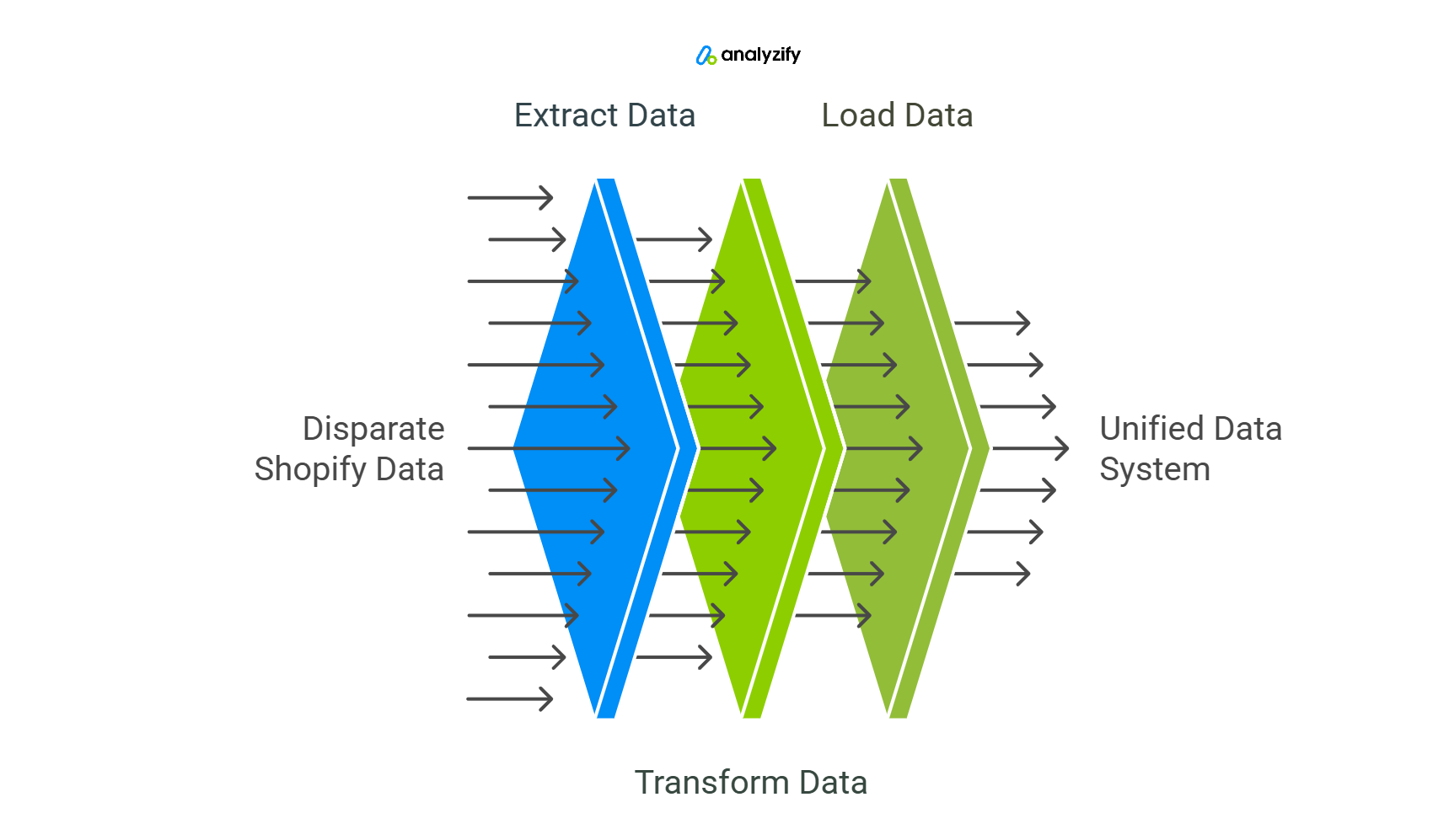
What you need is something simple, dependable, and built to make your workflow easier. In this post, you’ll explore:
- The Best Shopify ETL Tools in 2025
- Each Tool’s Key Features, Pros and Cons
- The Benefits Of ETL Tools For Shopify Stores
Let’s get started!
🎯Bonus Content: Confused about how it all works? Start with our Step-By-Step Look at ETL for Shopify Stores — it’s written for those without a tech background to help you get the basics without getting overwhelmed.
Top Shopify ETL Tools In 2025 (Key Features, Pros & Cons)
Over 85% of Shopify merchants use apps and tools to improve their performance in 2025 — which makes choosing the right Shopify ETL tool even more important than ever.
Below is a curated list of the best Shopify ETL tools in 2025 that make sense for store owners and teams dealing with Shopify data every day:
Airbyte
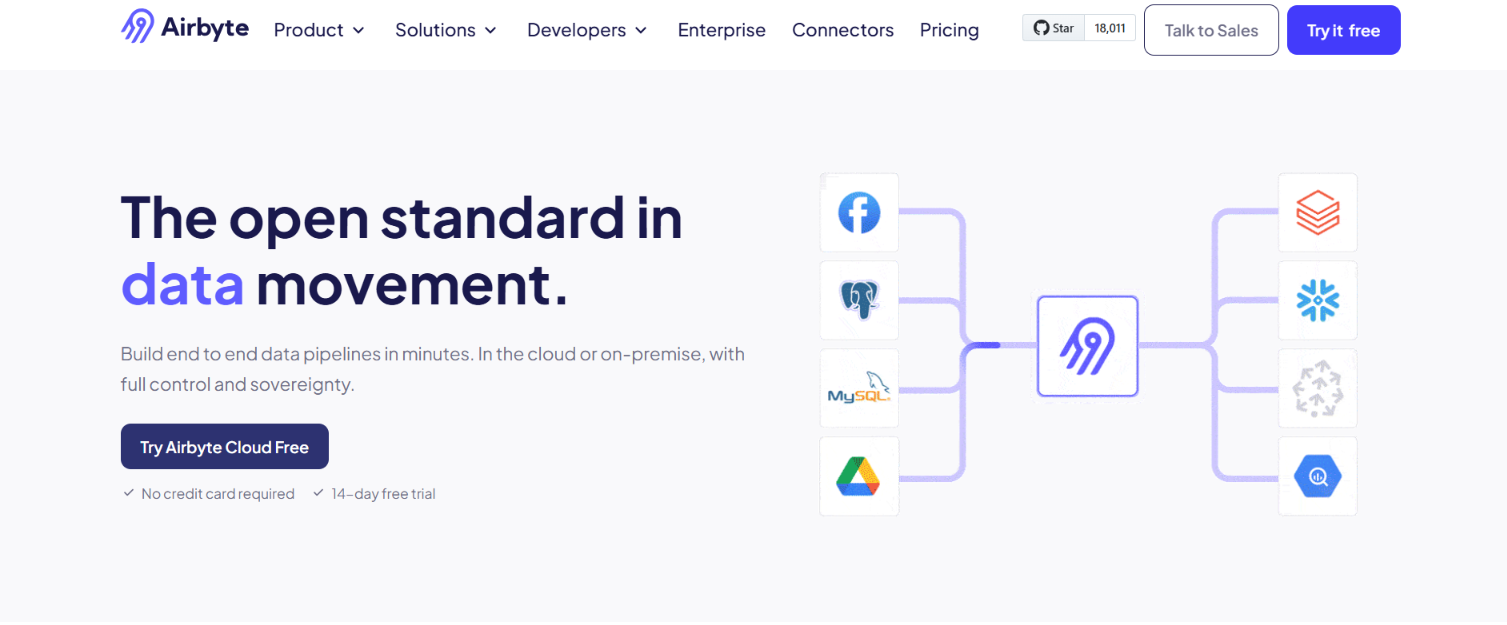
Airbyte is an open-source ELT (Extract, Load, Transform) platform designed to streamline data integration processes.
As a flexible Shopify ETL tool, it offers over 350 pre-built connectors, including one for Shopify, Airbyte enables users to extract data from various sources and load it into destinations like data warehouses, lakes, or databases.
Its modular architecture and active community support make it a flexible choice for businesses aiming to centralize their data workflows.
Key Features:
- Extensive Connector Library: Supports over 350 pre-built connectors, facilitating integration with a wide range of data sources and destinations.
- Custom Connector Development: Offers a Connector Development Kit (CDK) and AI-assisted Connector Builder for creating custom integrations.
- Integration with Transformation Tools: Compatible with tools like dbt for post-load data transformations.
- Open-Source and Self-Hosted Options: Provides flexibility with both open-source self-hosted and managed cloud deployment options.
- Security and Compliance: This Shopify ETL tool includes enterprise-grade security features like encryption and role-based access, and complies with standards such as GDPR and HIPAA.
Pros:
- Highly customizable and extensible, catering to diverse data integration needs.
- Strong community support with active forums and documentation.
- Flexible deployment options to suit various organizational requirements.
Cons:
- Like many Shopify ETL tools, Airbyte has a steep learning curve during initial setup, particularly for non-technical users.
- Some connectors may require additional development effort to meet specific use cases.
- Resource-intensive operations might necessitate infrastructure for optimal performance.
Portable Io
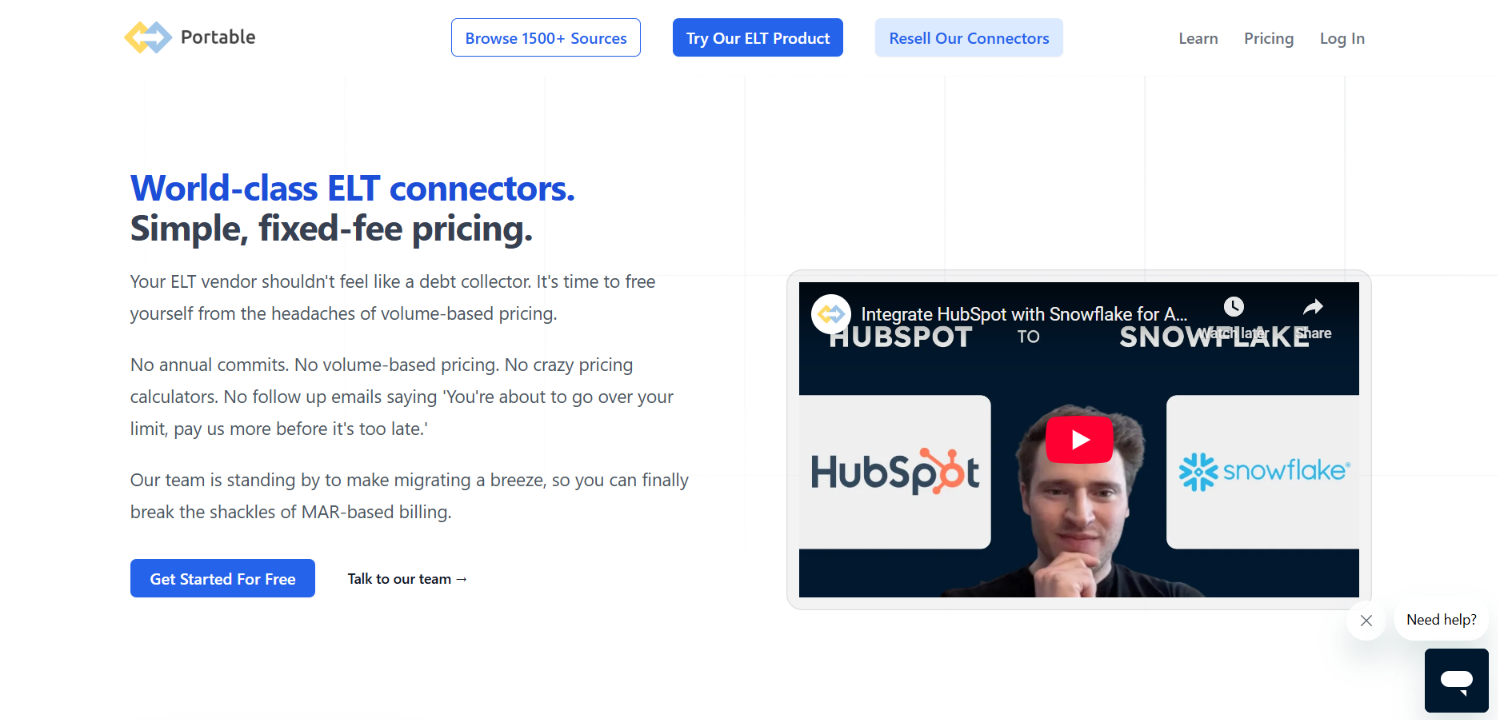
Portable.io is a cloud-based Shopify ETL tool designed to simplify data integration processes for businesses.
It offers a no-code solution, enabling users to connect various data sources to their preferred data warehouses without extensive technical expertise.
Portable.io supports a wide range of connectors, including one for Shopify, facilitating seamless data extraction and loading.
Key Features:
- No-Code Interface: Allows users to set up data pipelines without writing code, making it accessible to non-technical users.
- Wide Connector Support: Offers over 300 pre-built connectors, including Shopify, enabling integration with various data sources.
- Custom Connector Development: Provides the capability to build new integrations on-demand, catering to unique business needs.
- Flexible Deployment: Being cloud-based, it eliminates the need for on-premises infrastructure, offering scalability and flexibility.
- Predictable Pricing: Features a fixed-cost pricing model per data flow, ensuring transparency and cost predictability.
Pros:
- Unlike many Shopify ETL tools, Portable offers user-friendly interfaces which makes them accessible to users without a technical background.
- Extensive library of connectors facilitates integration with numerous data sources.
- Quick deployment and setup, reducing time to value.
- Transparent pricing model aids in budgeting and cost management.
Cons:
- While it offers a broad range of connectors, some complex data transformations may require additional tools or custom development.
- The fixed-cost pricing model, while predictable, may be higher compared to other Shopify ETL tools.
🎯Bonus Content: Check out “Why You Need Server-Side Tracking for Shopify in 2025” and how it helps improve data accuracy and attribution.
Fivetran
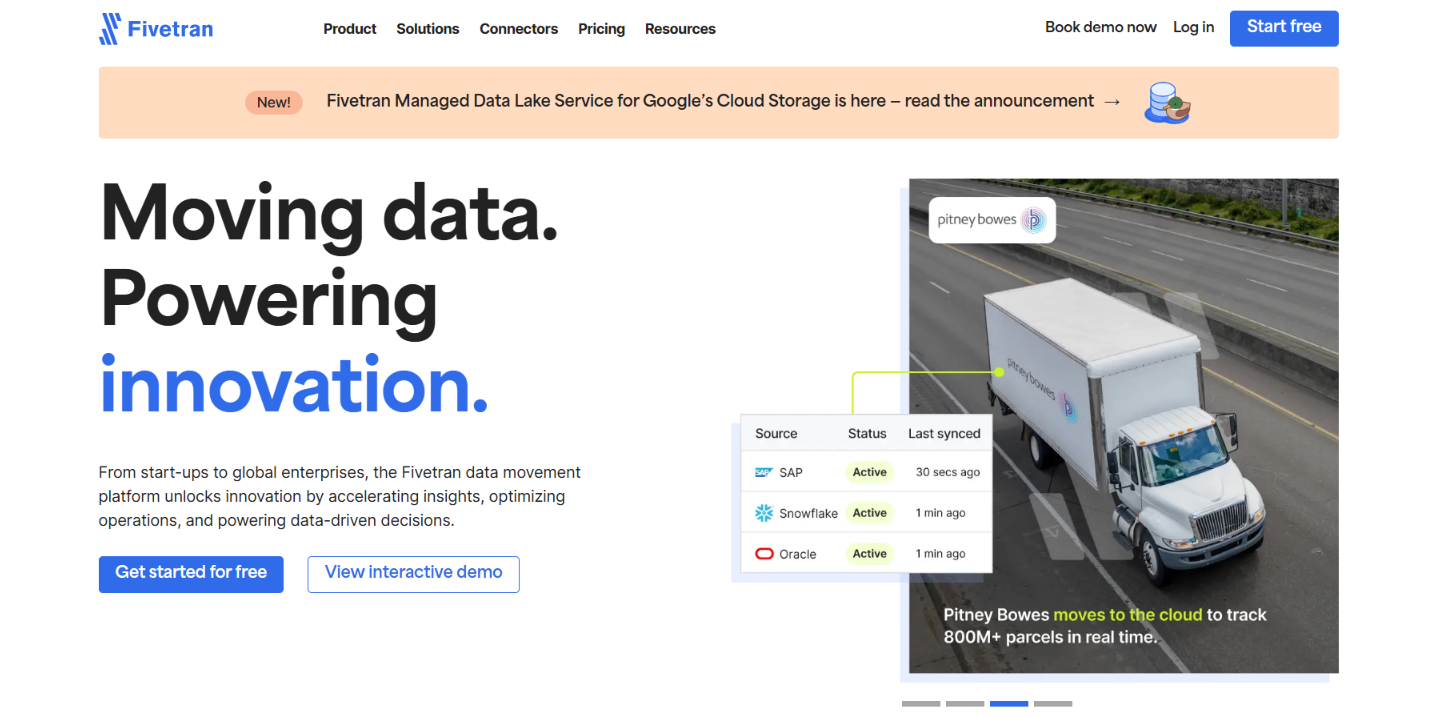
Fivetran is a fully managed ELT (Extract, Load, Transform) platform designed to simplify data integration processes.
Fivetran offers a wide range of pre-built connectors, including one specifically for Shopify.
Its automated approach and robust infrastructure make it a reliable choice for businesses aiming to centralize their data workflows.
Key Features:
- Pre-Built Connectors: Supports over 300 pre-built connectors, facilitating integration with a wide range of data sources and destinations.
- Automated Data Synchronization: Offers automated, incremental data syncing, ensuring that data is always up-to-date without manual intervention.
- Data Transformation Support: Provides integration with transformation tools like dbt, enabling users to transform data post-load for analytics and reporting.
- Security and Compliance: As one of the top Shopify ETL tools come with enterprise-grade security features, including encryption and role-based access controls, with compliance standards like GDPR and HIPAA.
- Scalability: Designed to handle large volumes of data, making it suitable for businesses of varying sizes.
Pros:
- The user-friendly interface makes this Shopify ETL tool a great option for teams without deep technical expertise.
- Extensive library of connectors facilitates integration with numerous data sources.
- Automated data syncing reduces the need for manual data handling.
- Strong security measures ensure data protection and compliance.
Cons:
- Pricing is based on monthly active rows, which can become expensive as data volumes grow.
- It offers limited flexibility for customizing connectors compared to open-source Shopify ETL tools.
- Being a managed service, it offers less control over the data integration process for users seeking more customization.
Stitch Data
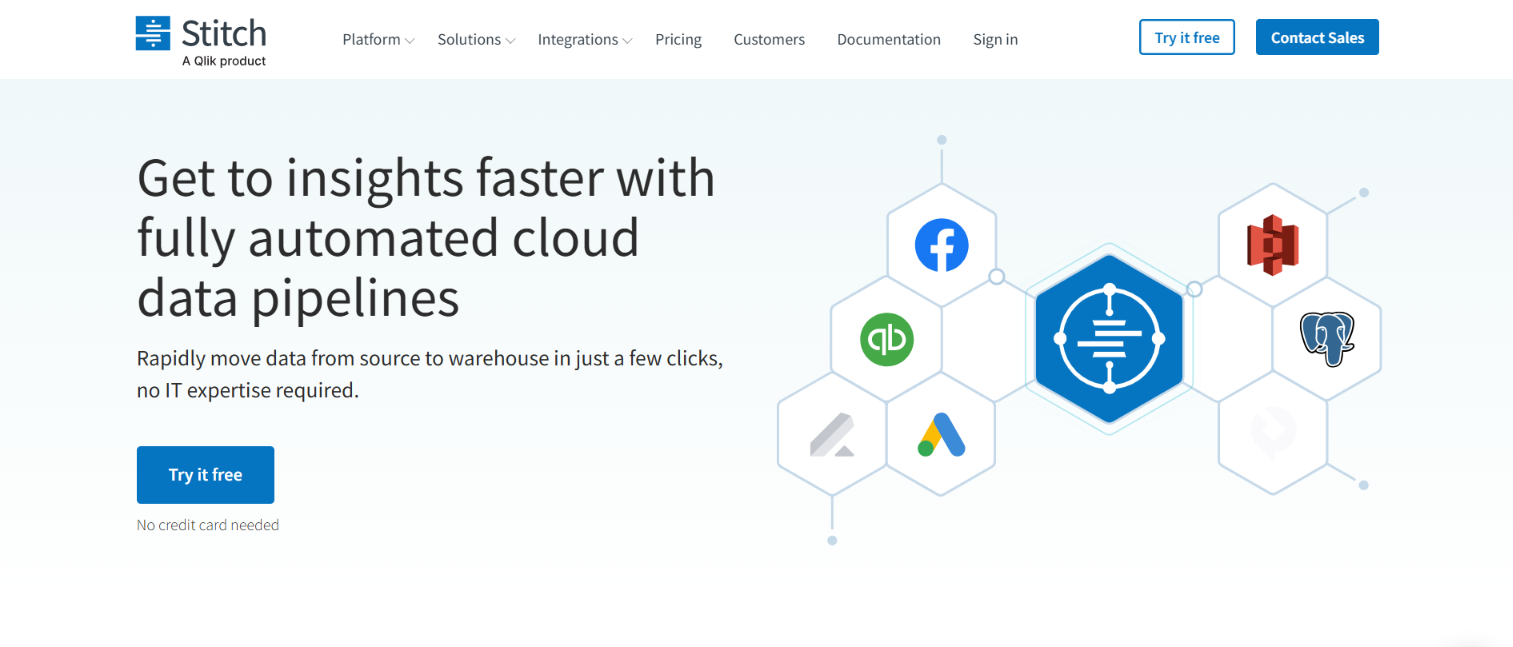
Stitch Data is a cloud-first, developer-friendly Shopify ETL tool built to simplify data integration workflows.
It offers an easy approach to replicating data from various sources, including Shopify, into data warehouses like Amazon Redshift, Google BigQuery, and Snowflake.
With its emphasis on ease of use and rapid deployment, Stitch enables businesses to set up data pipelines in minutes without extensive coding.
Key Features:
- Pre-Built Connectors: Supports over 130 data sources, including Shopify, facilitating seamless data extraction.
- Automated Data Replication: Offers scheduled and real-time data syncing, ensuring up-to-date information in your data warehouse.
- User-Friendly Interface: Provides an intuitive UI that simplifies the setup and management of data pipelines.
- Scalability: Designed to handle varying data volumes, making it suitable for businesses of all sizes.
- Security and Compliance: Implements robust security measures, including encryption and role-based access control, adhering to standards like GDPR and HIPAA.
Pros:
- Quick and easy setup, enabling rapid deployment of data pipelines.
- Extensive library of connectors reduces the need for custom integrations.
- Automated data syncing minimizes manual intervention and potential errors.
- The transparent pricing model makes this Shopify ETL tool easier to budget for, especially for growing ecommerce teams.
Cons:
- Limited data transformation capabilities compared to some competitors; primarily focuses on data extraction and loading.
- May require additional tools or custom development for complex transformation needs.
- Being a managed service, it offers less control over the data integration process for users seeking more customization.
Panoply
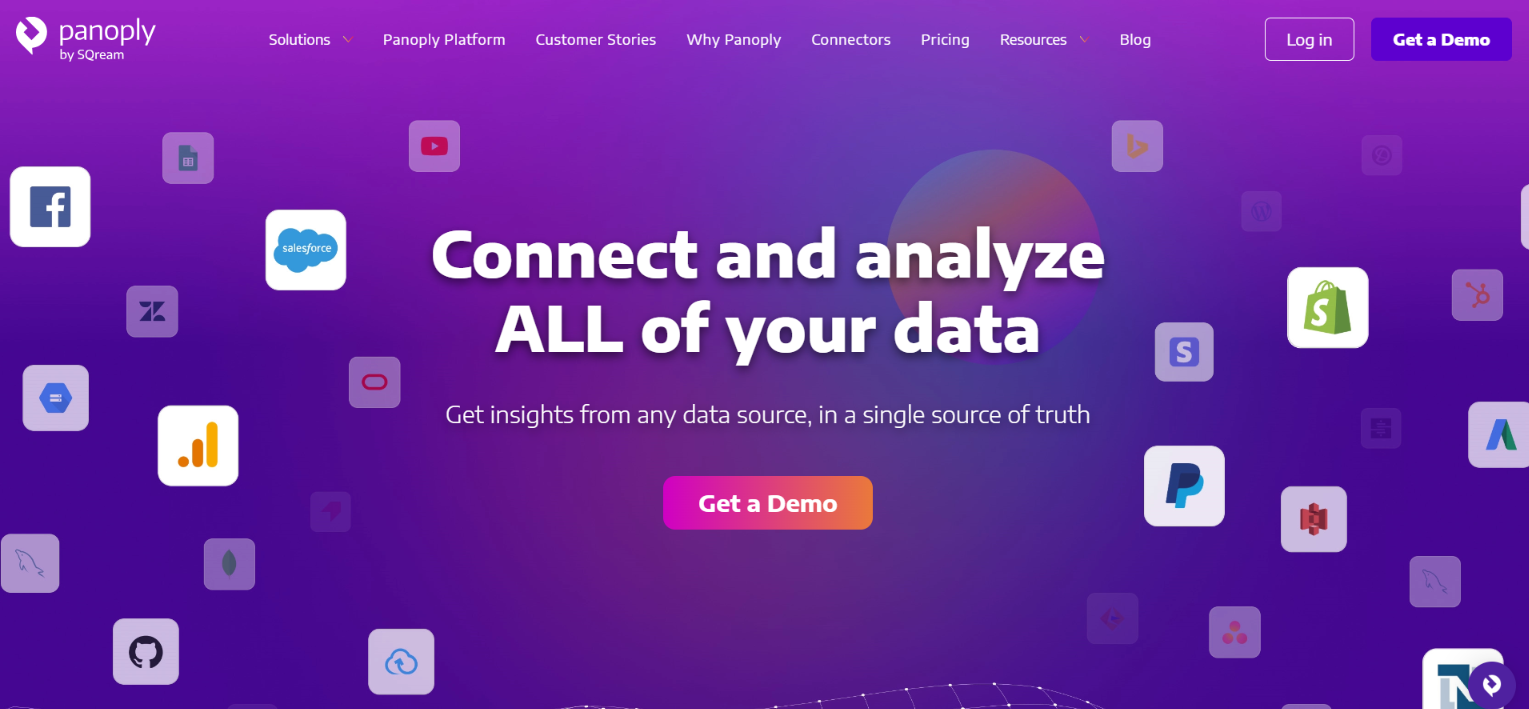
Panoply is a cloud-based data platform that stands out among Shopify ETL tools by combining built-in ELT capabilities with data warehousing.
It offers a no-code solution, enabling users to integrate various data sources, including Shopify, without extensive technical expertise.
Panoply’s platform is designed to streamline data integration, storage, and analysis, making it accessible to businesses of all sizes.
Key Features:
- Code-Free Data Integration: Panoply allows users to connect and sync data from over 80 sources, including Shopify, Google Ads, Facebook Ads, and Stripe, without writing any code.
- Built-In Data Warehousing: Unlike many other Shopify ETL tools, Panoply includes a fully managed data warehouse that automatically organizes and stores your data — no separate infrastructure needed.
- Automated Data Management: Panoply handles schema detection, indexing, and data maintenance tasks, reducing the complexity of data management.
- Real-Time Data Syncing: The platform supports real-time data ingestion, ensuring that users have access to the most up-to-date information.
- Seamless BI Tool Integration: Panoply integrates with popular business intelligence tools like Tableau, Looker, Power BI, and Grafana, facilitating data analysis and visualization.
- Security and Compliance: It implements robust security measures, including encryption and access controls, adhering to industry standards and regulations.
Pros:
- User-friendly interface suitable for users with limited technical backgrounds.
- Comprehensive data integration capabilities with a wide array of connectors.
- Automated data management reduces manual intervention and potential errors.
- Scalable infrastructure accommodates growing data volumes.
Cons:
- Limited advanced data transformation features compared to some specialized ETL tools.
- May not offer the same level of customization as open-source or developer-focused platforms.
🎯Bonus Content: Shopify Plus vs. Shopify Markets — Explore each of their features, differences, and how to pick the right one for your Shopify store!
Matillion
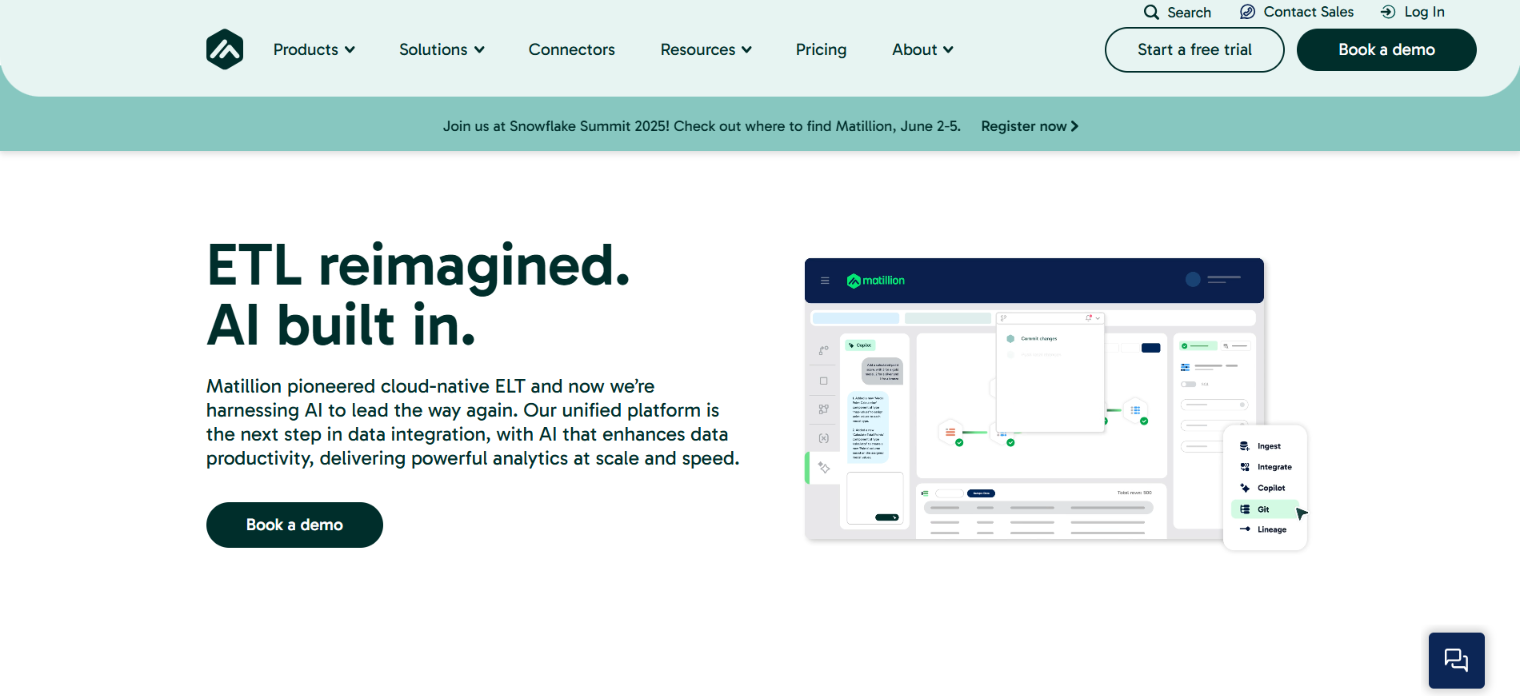
Matillion is a cloud-native ETL (Extract, Transform, Load) platform designed to simplify data integration processes for businesses.
Matillion stands out among Shopify ETL tools by offering a user-friendly interface and robust capabilities to extract, transform, and load data into cloud data warehouses like Amazon Redshift, Snowflake, and Google BigQuery.
Matillion provides connectors for numerous data sources, including Shopify, facilitating seamless data integration for ecommerce businesses.
Key Features:
- Shopify Integration: Matillion offers connectors to integrate Shopify data into cloud data warehouses such as Amazon Redshift and Snowflake, enabling businesses to centralize their ecommerce data for analysis.
- Cloud-Native Architecture: Designed specifically for cloud data platforms, Matillion leverages the scalability and performance of cloud environments to handle large volumes of data efficiently.
- User-Friendly Interface: Provides an intuitive, browser-based interface that allows users to design, schedule, and manage ETL workflows without extensive coding.
- Scalability: Capable of handling data integration needs for businesses of varying sizes, from small startups to large enterprises.
- Security and Compliance: Implements robust security measures, including encryption and access controls, adhering to industry standards and regulations.
Pros:
- Simplifies the process of integrating Shopify data into cloud data warehouses, facilitating comprehensive data analysis.
- Offers a user-friendly interface that reduces the learning curve for new users.
- Cloud-native design ensures scalability and efficient performance.
- Compared to other Shopify ETL tools, it supports a wide range of data sources and destinations, offering greater flexibility for diverse tech stacks.
Cons:
- May require additional configuration for complex data transformation needs.
- Being a managed service, it offers less control over the data integration process for users seeking more customization.
🎯Bonus Content: Expanding globally with Shopify Markets? Learn how to avoid SEO issues and optimize your setup with “Shopify Markets & SEO – What You Need to Know”
DataChannel
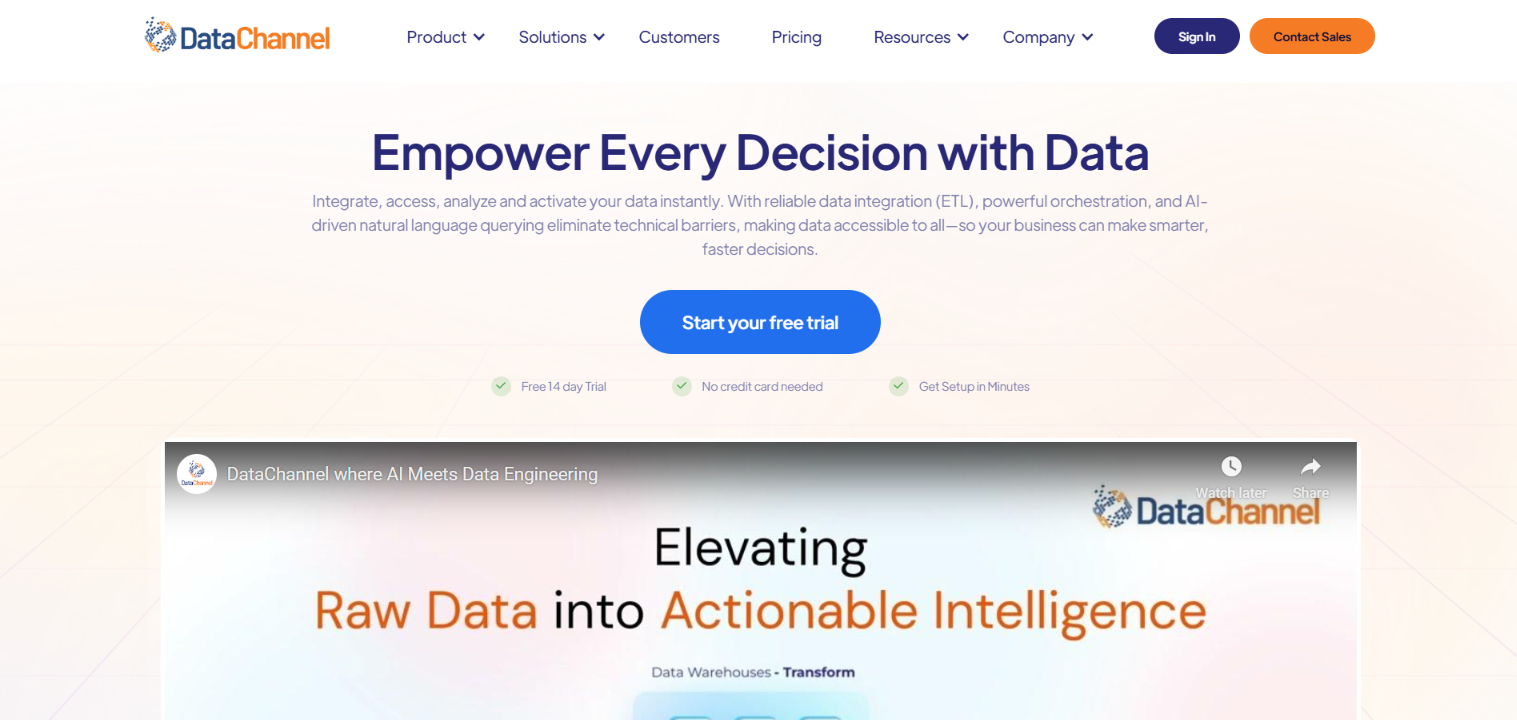
DataChannel is a no-code, cloud-native platform that fits well within the landscape of modern Shopify ETL tools in 2025.
With over 100 pre-built integrations, including one for Shopify, DataChannel enables users to extract data from various sources and load it into destinations like data warehouses, lakes, or databases.
Its user-friendly interface and robust features make it a practical choice for organizations aiming to centralize their data workflows.
Key Features:
- Shopify Integration: DataChannel offers a connector to integrate Shopify data into cloud data warehouses such as Amazon Redshift, Google BigQuery, and Snowflake, enabling businesses to centralize their ecommerce data for analysis.
- No-Code Interface: As with most user-friendly Shopify ETL tools, it offers a browser-based, no-code interface for designing, scheduling, and managing data workflows.
- Pre-Built Connectors: Supports over 100 pre-built connectors, facilitating integration with a wide range of data sources and destinations.
- Automated Data Synchronization: Offers automated, incremental data syncing, ensuring that data is always up-to-date without manual intervention.
- Data Transformation Support: Provides integration with transformation tools, enabling users to transform data post-load for analytics and reporting.
- Security and Compliance: Implements robust security measures, including encryption and role-based access control, adhering to standards like GDPR and HIPAA.
Pros:
- User-friendly interface suitable for users with limited technical backgrounds.
- Extensive library of connectors facilitates integration with numerous data sources.
- Automated data syncing reduces the need for manual data handling.
- Strong security measures ensure data protection and compliance.
Cons:
- While it offers a broad range of connectors, some complex data transformations may require additional tools or custom development.
- Being a managed service, it offers less control over the data integration process for users seeking more customization.
Talend
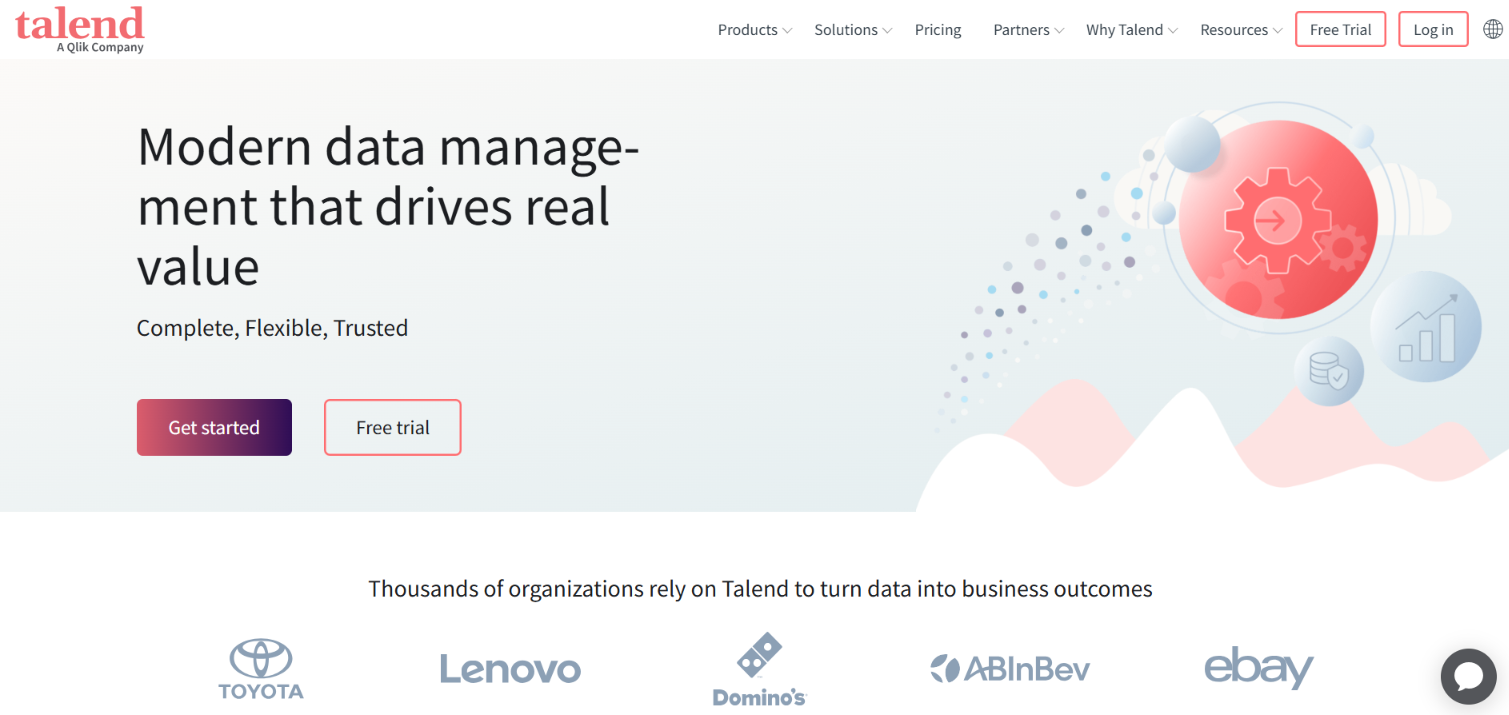
Talend is a comprehensive, enterprise-grade data integration platform that supports both ETL and ELT workflows.
It provides a full suite of tools to connect, transform, and manage data from various sources, including Shopify, which makes it a strong option for businesses looking for a flexible Shopify ETL tool in 2025.
Key Features:
- Extensive Connectivity: Talend supports over 900 data source connectors and components, facilitating integration with a wide range of data sources and destinations.
- Data Quality and Governance: The platform includes built-in data quality checks and governance features, ensuring the reliability and compliance of data throughout the integration process.
- Scalability: Talend’s cloud-native architecture can process large and growing volumes of data, which makes it a reliable choice for businesses scaling their operations with Shopify ETL tools.
- Security and Compliance: Implements robust security measures, including encryption and role-based access control, adhering to standards like GDPR and HIPAA.
Pros:
- Comprehensive data integration capabilities with a wide array of connectors.
- Built-in data quality and governance features enhance data reliability.
- Scalable infrastructure accommodates growing data volumes.
- Strong security measures ensure data protection and compliance.
Cons:
- Shopify ETL tools like Talend can have a steeper learning curve, especially for users who are new to data integration platforms.
- Being a comprehensive solution, it might be more complex than necessary for simple integration tasks.
Hevo Data
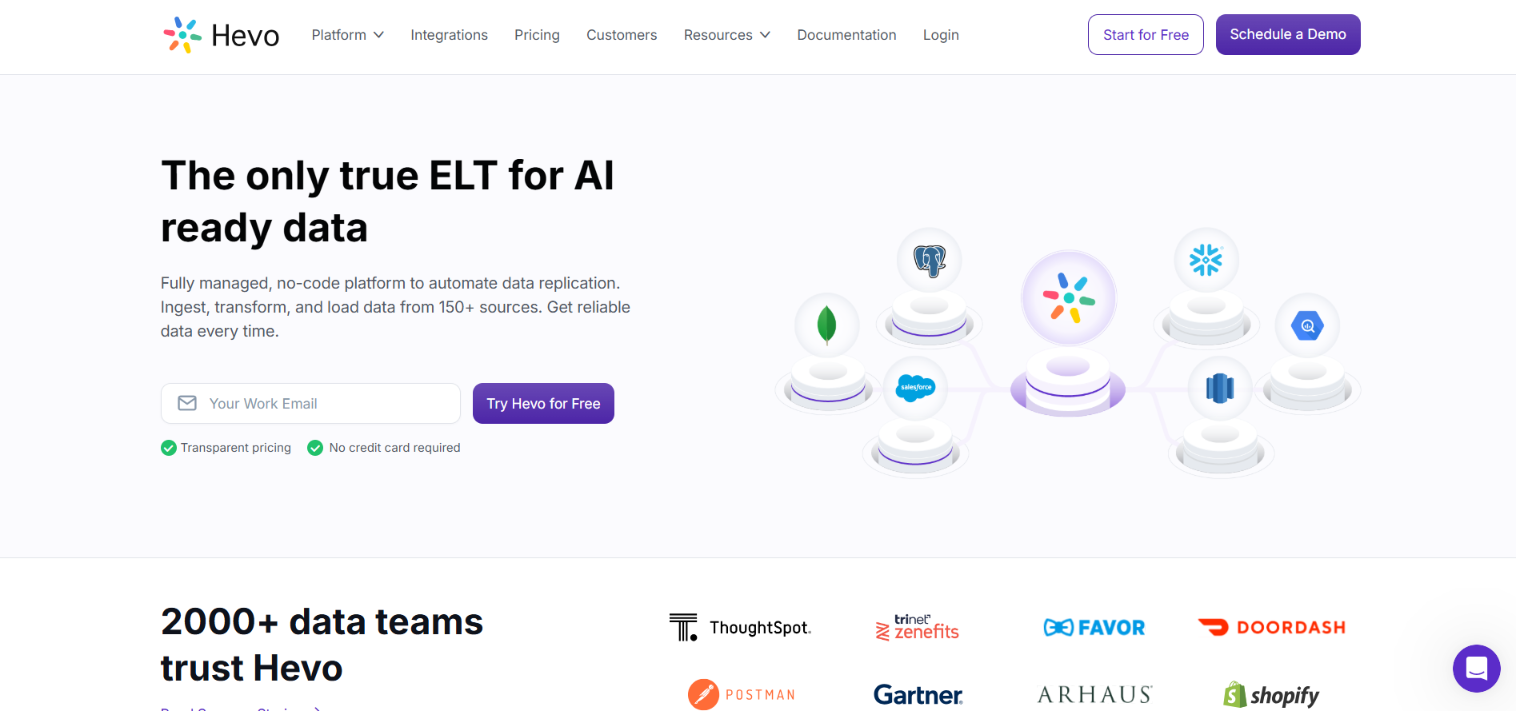
Hevo Data is a fully managed, no-code data pipeline platform that simplifies the integration of data from multiple sources into cloud data warehouses.
With over 150 pre-built connectors, including one for Shopify, Hevo allows businesses to automate data replication, transformation, and loading without writing any code, which makes it a strong option among the best Shopify ETL tools in 2025.
Key Features:
- Shopify Integration: Hevo provides a dedicated connector for Shopify, allowing users to extract data such as orders, customers, products, and more. The integration supports both REST API and Webhook methods, ensuring real-time data synchronization.
- No-Code Platform: Hevo’s intuitive interface enables users to set up data pipelines without any coding knowledge, which makes it accessible to non-technical users.
- Real-Time Data Replication: Hevo supports real-time data ingestion, ensuring that the data in your warehouse is always up-to-date.
- Automated Schema Management: The platform automatically detects and manages schema changes, reducing the need for manual intervention.
- Data Transformation: Hevo offers both pre-load and post-load data transformation capabilities, allowing users to clean, enrich, and prepare data for analysis using drag-and-drop features or custom Python scripts.
- Reverse ETL: With Hevo Activate, users can move data from their data warehouse back into operational tools like CRMs and marketing platforms, enabling actionable insights.
Pros:
- User-friendly interface suitable for users with limited technical backgrounds.
- Supports a wide range of data sources and destinations.
- Real-time data synchronization ensures up-to-date information.
- Automated schema management reduces manual workload.
- Comprehensive data transformation capabilities.
Cons:
- Shopify ETL tools like Hevo may make it difficult to edit existing pipelines, sometimes requiring users to recreate them entirely for changes.
- Some users have reported difficulties with scheduling jobs, especially across different time zones.
- Deleted pipelines may persist in the system, potentially causing confusion.
Funnel
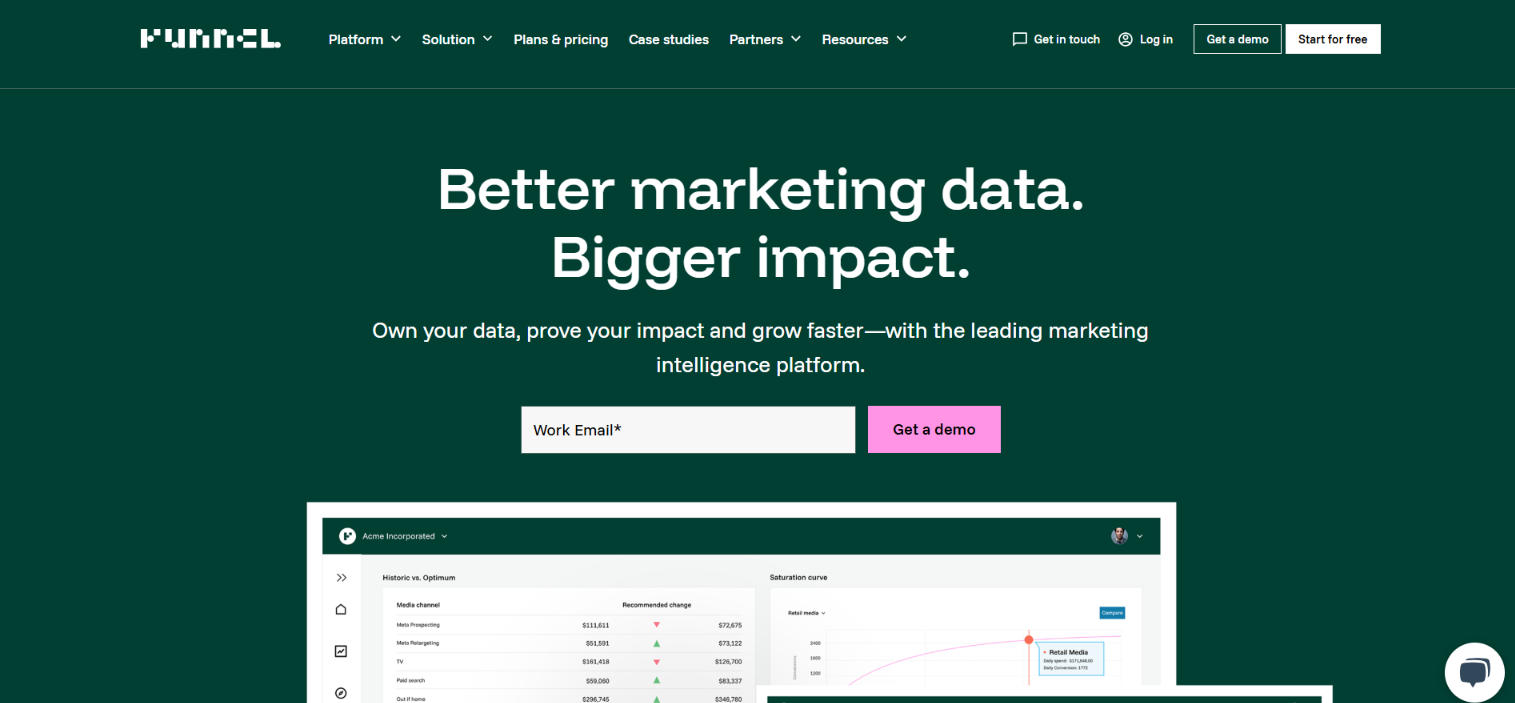
While Funnel isn’t a traditional ETL tool, but it serves a similar purpose for Shopify stores focused on marketing and performance data.
It offers a no-code platform that helps users extract and load data from multiple sources — including Shopify — into destinations like data warehouses, spreadsheets, and reporting tools.
Funnel’s platform is tailored to streamline data integration, storage, and analysis, making it accessible to businesses of all sizes.
Key Features:
- Shopify Integration: Funnel provides a straightforward connector to Shopify, allowing users to extract data such as orders, products, and customer information.
- No-Code Interface: Similar to other no-code Shopify ETL tools, Funnel offers a browser-based interface where users can design, schedule, and manage data workflows without writing code.
- Pre-Built Connectors: Supports over 500 pre-built connectors, facilitating integration with a wide range of data sources and destinations.
- Automated Data Synchronization: As expected from the best Shopify ETL tools in 2025, it enables automated, incremental syncing so that data remains accurate and up-to-date without manual intervention.
- Data Transformation Support: Provides built-in transformation capabilities, enabling users to clean and prepare data for analysis.
- Security and Compliance: Implements robust security measures, including encryption and role-based access control, adhering to standards like GDPR and CCPA.
Pros:
- User-friendly interface suitable for users with limited technical backgrounds.
- Extensive library of connectors facilitates integration with numerous data sources.
- Automated data syncing reduces the need for manual data handling.
- Strong security measures ensure data protection and compliance.
Cons:
- While it offers a broad range of connectors, some complex data transformations may require additional tools or custom development.
- As with managed Shopify ETL tools in 2025, it provides less flexibility and control over the integration process for teams that need deeper customization or backend access.
How ETL Tools Work with Shopify Data
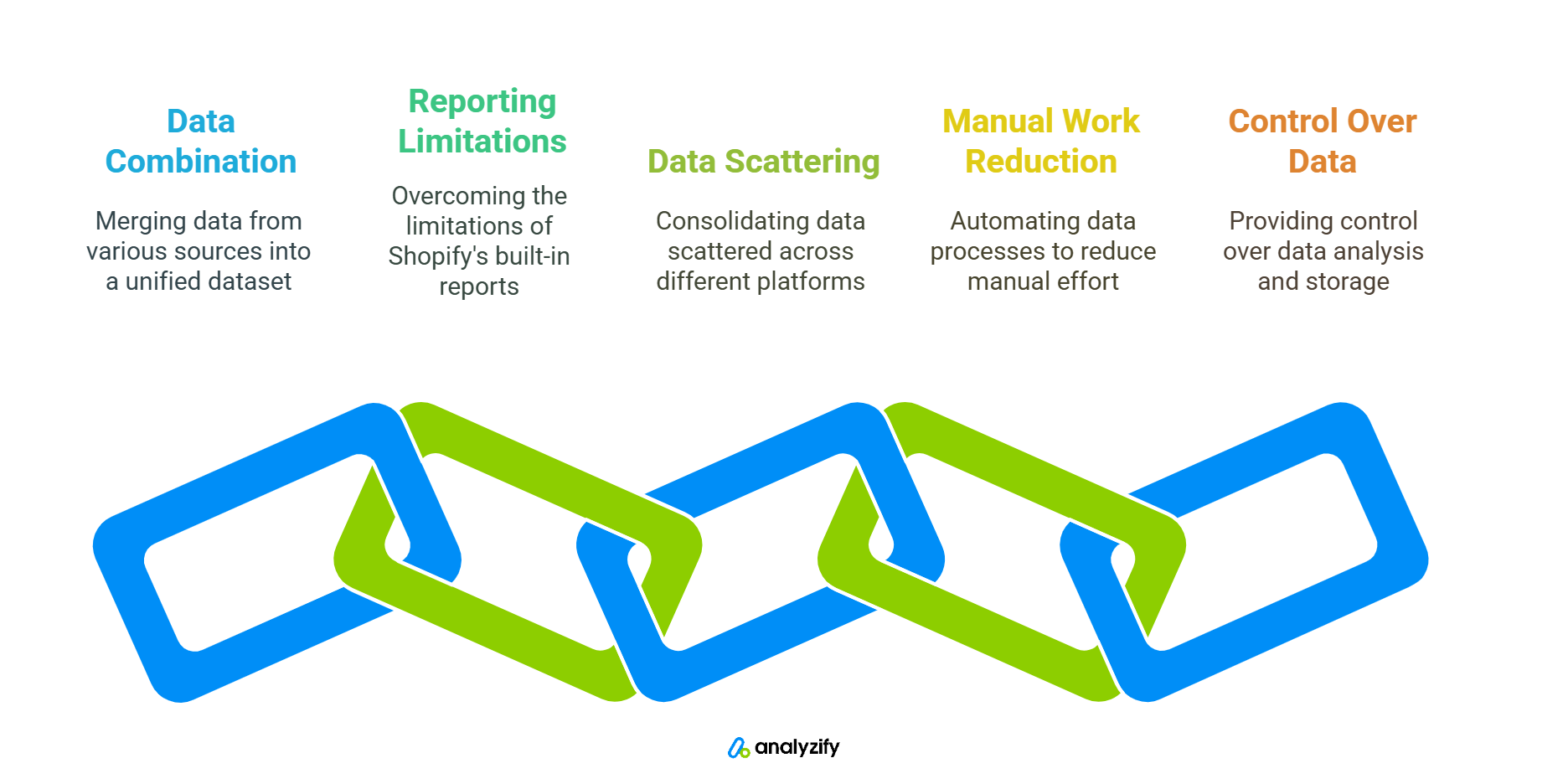
Shopify ETL tools help store owners move their data from Shopify into other systems where it can be better organized, analyzed, and used.
ETL stands for Extract, Transform, and Load: first pulling raw data out of Shopify, then reshaping it to fit business needs, and finally sending it into a destination like a data warehouse, analytics tool, or CRM.
For Shopify stores, ETL tools automate the heavy lifting around syncing orders, customers, products, inventory updates, and more. Instead of relying on manual exports or messy API connections, ETL tools manage these workflows efficiently.
Why Shopify Stores Need ETL Integrations
A Shopify store generates data nonstop, orders, customers, inventory changes, shipping updates, and more.
Without Shopify ETL tools, this data often stays siloed in the ecommerce platform or scattered across other apps, which makes day-to-day operations slower and less reliable.
Here’s how Shopify ETL tools help with real-world ecommerce workflows:
- Marketing automation: Automatically sync customer and order data to platforms like Klaviyo or Mailchimp, so campaigns are always targeting the right people at the right time.
- Inventory management: Keep stock levels up to date across warehouses, Shopify, and third-party logistics tools by moving inventory data into a centralized dashboard or system.
- Sales reporting: Pull order data into tools like Looker, Tableau, or Google Sheets to track sales, returns, and product performance without manual exports or spreadsheet errors.
- Customer support: Load order and shipping data into helpdesk tools like Gorgias or Zendesk to give support teams the context they need, instantly.
- Multi-channel sync: Use ETL to connect Shopify with external sales channels (e.g. Amazon, eBay) and ensure product, pricing, and fulfillment data stays consistent.
Shopify ETL tools solve these problems by automatically syncing and organizing Shopify data in real time.
FAQ: Top 10 Shopify ETL Tools For Ecommerce Data Integration
Here are the frequently asked questions about the best ETL tools for Shopify in 2025:
What are the best free ETL tools for Shopify?
Several free ETL tools for Shopify offer solid functionality without large upfront costs. Options like Airbyte and Portable provide reliable, low-barrier entry points for small businesses and growing ecommerce stores that want to automate Shopify data flows without investing in complex infrastructure.
What are the best open source ETL tools for Shopify?
Some of the most widely used open source ETL tools for Shopify include Airbyte and CloudQuery. These platforms give you full control over your data pipelines, allow for self-hosting, and are well-suited for technical teams looking to customize their Shopify data integration.
What is the data model used by Shopify and how does it affect ETL tool selection?
The Shopify data model includes linked and nested data objects such as orders, customers, products, and transactions. Because of this structure, it’s important to use Shopify ETL tools that can accurately extract and maintain these relationships during data syncs. Otherwise, reporting and analysis can become inconsistent or unreliable.
What does ETL stand for, and what does it mean?
ETL stands for Extract, Transform, Load. It’s the process of pulling data from a source like Shopify, reshaping or cleaning it, and then loading it into a target system such as a data warehouse or reporting tool. Shopify ETL tools automates this process to keep your store’s data organized, accurate, and accessible.
How do you choose the best ETL tools for Shopify in 2025?
Choosing the best Shopify ETL tool in 2025 depends on several factors: your store’s size, technical skill level, data sync needs, and which platforms you want to connect. Look for tools that support Shopify’s data structure, offer no-code or low-code interfaces if needed, and have pricing models that match your usage.
What’s the difference between ETL and ELT?
While ETL (Extract, Transform, Load) transforms data before loading it into the destination, ELT (Extract, Load, Transform) loads raw data first, then processes it within the target system (like BigQuery or Snowflake). Many Shopify ETL tools in 2025support both approaches, depending on how you manage and analyze your data.
Conclusion: Best ETL Tools For Shopify in 2025
Choosing the right Shopify ETL tool can make a big difference in how efficiently your store handles data.
From syncing orders and inventory to powering marketing automation and analytics, the right ETL tool for Shopify reduces manual work and improves visibility across your entire ecommerce operation.
Take the time to compare features, weigh the pros and cons, and choose a tool that aligns with your goals. Better data flow starts with the right Shopify ETL tools.
Read More:
- Shopify Markets vs. Multiple Stores | Pros, Costs, Limits
- Choosing Between Shopify and Shopify Plus: Features and Cost
- Shopify Fulfillment Network: Costs, Features, and Alternatives (2025)
- Top Shopify Alternatives: Compare Pricing & Features
- Ecommerce Ad Tracking Guide: Advanced Solutions for Shopify
- Shopify Markets vs. Expansion Stores | Pros, Costs, Limits
































